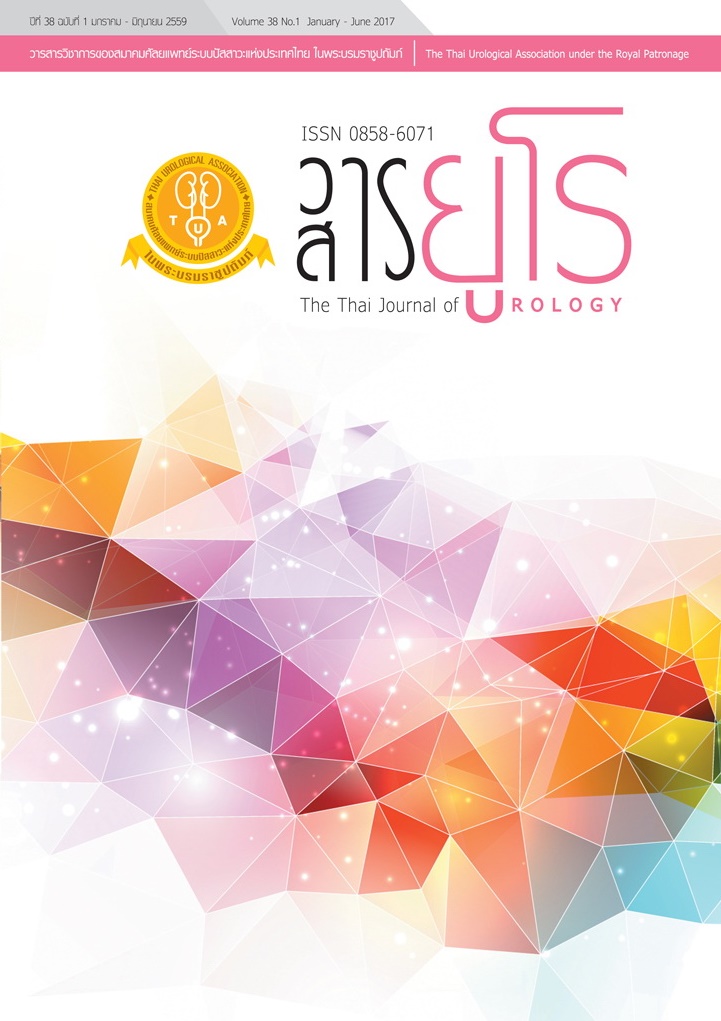Nephroureterectomy for upper urinary tract transitional cell carcinoma in Rajavithi Hospital: Experience in the last 8 years
Keywords:
Laparoscopic Nephroureterectomy, Upper Urinary Tract, Transitional Cell Carcinoma, การผ่าตัด nephroureterectomy แบบส่องกล้อง, มะเร็งระบบปัสสาวะส่วนบนAbstract
Objective: To evaluate operative outcomes after open and laparoscopic nephroureterectomy for upper urinary tract transitional cell carcinoma.
Material and methods: From Jan 1998 to Dec 2015, retrospective descriptive analysis was performed in 65 patients underwent radical nephroureterectomy at Rajavithi Hospital. Demographics, tumor characteristics, intraoperative and postoperative data were collected. Statistical analysis was performed using percentage, mean, mode and standard deviation (SD) for descriptive data and the Student T-test, Mann-Whitney U test, Chi-square test and Fisher Exact test for comparisons of the data.
Results: Twenty-eight patients (43.1%) and 37 patients (56.9%) underwent open and laparoscopic nephroureterectomy, respectively. The analysis revealed significantly lower blood loss (395.15 ml VS 738.89 ml, P<0.05) and morphine administration (5.37 doses VS 11.36 doses, P<0.05) in the laparoscopic nephroureterectomy group, however, the operation had significantly longer operative times than the open nephroureterectomy group (329.82 min VS 430.50 min, P<0.05). No significant differences of time to first diet and time to removal of catheter were observed.
Conclusion: Laparoscopic nephroureterectomy seems to be a safe alternative treatment for upper urinary tract TCC and offers the advantages of the laparoscopic procedure, i.e., less intraoperative blood loss and postoperative pain. Thus, the results of our study support the continued development of the laparoscopic technique in the management of upper urinary tract urothelial carcinoma.
การผ่าตัด nephroureterectomy ในผู้ป่วยมะเร็ง ระบบปัสสาวะส่วนบน ในโรงพยาบาลราชวีถี : ประสบการณ์ 8 ปี
การันต์ หริมเทพาธิป, ณัฐพงศ์ วงศ์วัฒนาเสถียร
หน่วยศัลยกรรมทางเดินปัสสาวะ กลุ่มงานศัลยกรรม โรงพยาบาลราชวิถี กรุงเทพฯ
บทคัดย่อ
วัตถุประสงค์: เพื่อศึกษาผลการรักษามะเร็งระบบปัสสาวะส่วนบน ชนิด transitional cell โดยการผ่าตัด radical nephroureterectomy แบบเปิด และส่องกล้อง
ผู้ป่วยและวิธีการศึกษา: ศึกษาแบบย้อนหลังจากเวชระเบียนผู้ป่วย ตั้งแต่ มกราคม 2551 ถึง ธันวาคม 2558 ในผู้ป่วยที่ได้รับ การผ่าตัด radical nephroureterectomy ที่โรงพยาบาลราชวิถี โดยข้อมูลที่ศึกษา ได้แก่ ข้อมูลทั่วไปของผู้ป่วย ผลการรักษา และภาวะแทรกซ้อนระหว่างและหลังการผ่าตัด
ผลการศึกษา: ผู้ป่วยได้รับการผ่าตัด nephroureterectomy จำนวน 65 ราย จำแนกเป็น 2 กลุ่ม คือ ได้รับผ่าตัดแบบเปิด จำนวน 28 ราย (ร้อยละ 43.1) และผ่าตัดแบบส่องกล้อง จำนวน 37 ราย (ร้อยละ 56.9) พบว่า ในกลุ่มที่ได้รับการผ่าตัดแบบส่องกล้อง มีการเสียเลือดในปริมาณน้อยกว่า และมีความต้องการในการได้รับยาแก้ปวดน้อยกว่า กลุ่มผ่าตัดแบบเปิด อย่างมีนัยสำคัญทาง สถิติ สำหรับกลุ่มที่ได้รับการผ่าตัดแบบเปิด พบว่า ใช้ระยะเวลาในการผ่าตัดน้อยกว่ากลุ่มที่ผ่าตัดส่องกล้องอย่างมีนัยสำคัญ ทางสถิติ และจาการศึกษา ไม่พบความแตกต่างของภาวะแทรกซ้อน ระหว่างผ่าตัด และหลังผ่าตัด
สรุป: การผ่าตัด nephroureterectomy แบบส่องกล้องเป็นแนวทางการรักษาที่เป็นทางเลือกที่ปลอดภัย ในการรักษาผู้ป่วยมะเร็ง ทางเดินปัสสาวะส่วนบน โดยมีข้อดี คือ เสียเลือดปริมาณน้อย และอาการปวดหลังผ่าตัดน้อย


